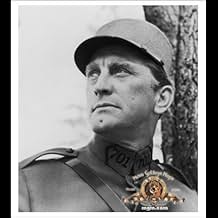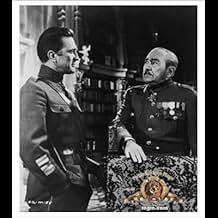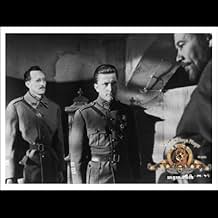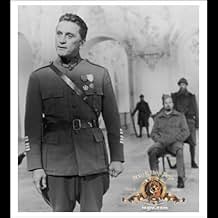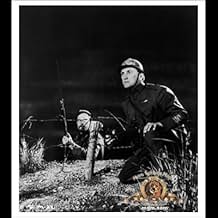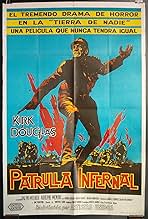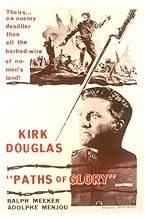Après avoir refusé d'attaquer où l'ennemi était ammassée, un général accuse les soldats de lâcheté et leur officier commandant doit leur défendre.Après avoir refusé d'attaquer où l'ennemi était ammassée, un général accuse les soldats de lâcheté et leur officier commandant doit leur défendre.Après avoir refusé d'attaquer où l'ennemi était ammassée, un général accuse les soldats de lâcheté et leur officier commandant doit leur défendre.
- Réalisation
- Scénario
- Casting principal
- Nomination aux 1 BAFTA Award
- 5 victoires et 3 nominations au total
- Pvt. Pierre Arnaud
- (as Joseph Turkel)
- German Singer
- (as Susanne Christian)
- Capt. Sancy
- (non crédité)
Résumé
Avis à la une
Kubrick displays a great control of sound effects and camera movement in the brief but effective battle scenes that expertly depict the controlled chaos that was trench warfare during WWI. Things get juicier during the ensuing courtroom battle where the deafening disparity between the elite who propagate and profit from war and the common citizens who suffer and die in war is shown with great lucidity.
Unlike later Kubrick epics, this runs at a crisp 90 minutes, though suffers briefly from a slow and awkwardly staged opening ten minutes before Douglas comes on screen. Ultimately, this holds up very well to modern scrutiny thanks to the flawlessness of Kurbick's craft, the amazing ensemble acting, and the surprising depth of its philosophical and psychological pondering. "Paths of Glory" is more anti-arrogance than anti-war, and is unapologetically sentimental and pro-soldier. As such, much can still be gleaned from its message.
Now, fifty years later, the film is still timely, having lost none of its power to illuminate. Thanks be to Kirk Douglas for taking a chance on an unproven Stanley Kubrick and getting Allied Artists to finance what was so clearly a non-commercial project. I suspect too, that it was at AA's insistence that Hollywood veterans be cast, even though the movie was shot to great advantage amidst the majestic settings of old Europe. Given the film's message, I think Kubrick would have preferred no-name principals, but then, who could have surpassed the oily charm of Adolphe Menjou's diabolical general, or the pathetic repulsiveness of Timothy Carey's sacrificial dog-face. (It's ironic that the part of the cowardly lieutenant went to an authentic war-hero, naval air-ace Wayne Morris, then only two years away from an untimely death.) This many decades later, I still have mixed feelings about the celebrated final scene. On one hand, it's so clearly manipulative (someone once called it a "male weepie"), that I try to steel myself against its undeniable force; on the other, it's so superbly well done that the humming chorus of universal brotherhood never fails to move me, even after this many viewings.
Researchers digging into origins of 60's counter-culture should check out themes and characterizations of the screen-play, particularly Timothy Carey's social outcast and Fred Bell's absolutely stunning thirty seconds of emotional break-down. For this is one of the few films from the conformist Eisenhower era to cast a shadow forward in time and serve as a reference point for future generations. The film's abundant cynicism may no longer be as revealing as it once was, thanks to Vietnam. Yet the emotional honesty remains as fresh and compelling as ever in its search for a gut-level depiction of real human anguish. Above all, Kubrick's anti-war classic points toward a more civilized potential amidst the barbarities and passions of combat, whether French or American, and given present political realities, still has many lessons to offer.
The more I watch Stanley Kubrick's films, the more I am genuine blown away and captivated by his incredible film making. He captures the claustrophobia and futility of trench warfare, what a ghastly piece of history The First World War was.
It shows the true depravity of some men, as well as the extraordinary humanity some have inside. Definitely dramatic and full of some impressive sequences, it also boasts and ending that may just
It's so twisted, Mireau is one of those characters that manages to get under your skin, he burrows away into the unit like a termite, it's a terrific performance from George Macready, he's so twisted and full of malice.
Kirk Douglas is incredible, it's performances such as this that make it clear he was a great, that scene where turns down the promotion was fantastic.
It truly is a brilliant film.
9/10.
Winston Churchill famously claimed that it was this movie that was closest to evoking the atmosphere of WW1 and the military mind. And you know what, he is right. For one thing, Paths of Glory is gorgeously filmed, with relentlessly beautiful cinematography and nice costumes and scenery. The screenplay is sometimes humorous, sometimes moving and sometimes even haunting, either way it was some fine writing. The efficiency of Kubrick's direction is proof of a great man at work.
The performances were superb. As the general who orders the hopeless attack on the German position, Adolphe Menjou's character is perceived as a villain not because of being an officer adhering to the letter, but that he is seen as "the arrogant aristocrat" because of his fear of the working classes than his hatred of the enemy. Among the cast, Timothy Carey and Kirk Douglas especially were outstanding. And the music? That is one rousing score I can tell you. Great movie. 10/10 Bethany Cox
Le saviez-vous
- AnecdotesBanned in Spain under Gen. Francisco Franco's dictatorship for its anti-military message. It wasn't released until 1986, 11 years after Franco's death.
- GaffesCol. Dax commits a glaring military faux pas by jamming his hands into his pants pockets while standing and walking in the courtroom during the trial. No military officer would do such a thing, particularly in such a formal setting as a court martial.
- Citations
Pvt. Pierre Arnaud: I'm not afraid of dying tomorrow, only of getting killed.
soldier in bunk: That's as clear as mud.
Pvt. Pierre Arnaud: Well, which would you rather be done in by: a bayonet or a machine gun?
soldier in bunk: Oh, a machine gun, naturally.
Pvt. Pierre Arnaud: Naturally, that's just my point. They're both pieces of steel ripping into your guts, only the machine gun is quicker, cleaner, and less painful, isn't it?
soldier in bunk: Yeah, but what does that prove?
Pvt. Pierre Arnaud: That proves that most of us are more afraid of getting hurt than of getting killed. Look at Bernard. He panics when it comes to gas. Gas doesn't bother me a bit. He's seen photos of gas cases. Doesn't mean anything to me. But I'll tell you something though, I'd hate like the devil to be without my tin hat. But on the other hand I don't mind not having a tin hat for my tail. Why is that?
soldier in bunk: You're darn tootin', because...
Pvt. Pierre Arnaud: Because I know a wound to the head would hurt much more than one to the tail. The tail is just meat but the head- ah, the head is all bone.
soldier in bunk: That's...
Pvt. Pierre Arnaud: Tell me this. Aside from the bayonet, what are you most afraid of?
soldier in bunk: High explosives.
Pvt. Pierre Arnaud: Exactly, and it's the same with me, because, because I know that it can chew you up worse than anything else. Look, just like I'm trying to tell you, if you're really afraid of dying you'd be living in a funk all the rest of your life because you know you've got to go someday, anyday. And besides...
soldier in bunk: Yes?
Pvt. Pierre Arnaud: If it's death that you're really afraid of why should you care about what it is that kills you?
soldier in bunk: Oh, you're too smart for me, Professor. All I know is, nobody wants to die.
- Versions alternativesThe Criterion DVD version features the opening and closing MGM logos.
- ConnexionsEdited into Hai-Kubrick (1999)
- Bandes originalesLa Marseillaise
(1792) (uncredited)
Written by Claude Joseph Rouget de Lisle
In the score during the opening credits
Meilleurs choix
- How long is Paths of Glory?Alimenté par Alexa
Détails
- Date de sortie
- Pays d’origine
- Langues
- Aussi connu sous le nom de
- Patrulla infernal
- Lieux de tournage
- Schloß Schleißheim, Oberschleißheim, Bavaria, Allemagne(Command Headquarter)
- Société de production
- Voir plus de crédits d'entreprise sur IMDbPro
Box-office
- Budget
- 935 000 $US (estimé)
- Montant brut mondial
- 8 290 $US
- Durée1 heure 28 minutes
- Couleur
- Mixage
- Rapport de forme
- 1.66 : 1
Contribuer à cette page







